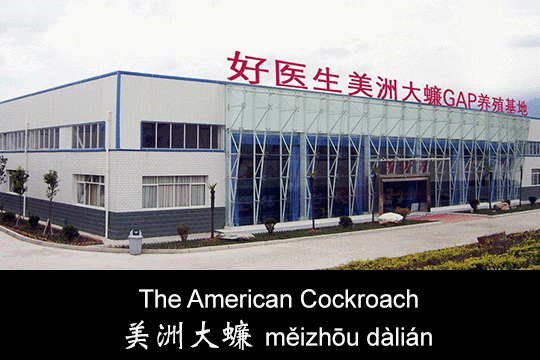Three types of snake oil

1. Three types of snake oil
Recent Chinese media reports have debunked the claimed health benefits of various “nutritional” supplements like caterpillar fungus, a.k.a. Himalayan Viagra (冬虫夏草 dōngchóngxiàcǎo), and donkey-hide gelatin (阿胶 ējiāo), and Chinese customers’ skepticism toward “traditional” cures is growing.

Here are three dodgy medicaments that have been examined critically online and in the media in China recently:
1. The American Cockroach (美洲大蠊 měizhōu dàlián)
The American cockroach, Periplaneta americana, is believed by some enthusiasts of Chinese medicine to have therapeutic qualities. This means that there’s big money in breeding roaches.
The South China Morning Post reports that “the world’s largest cockroach farm is breeding 6 billion adult cockroaches a year and using artificial intelligence to manage a colony larger than the world’s human population — all for medicinal use.”
- “Potion of Recovery,” or Kangfu Xinye (康复新液 kāngfù xīn yè), is the end product of the cockroaches, made and distributed by Gooddoctor Pharmaceutical Group of Chengdu, Sichuan.
- “It is the first time in history so many cockroaches have been confined and bred in one space… The facility achieved its unrivaled efficiency partly by being controlled by a ‘smart manufacturing’ system powered by artificial intelligence (AI) algorithms,” say the good doctors of Gooddoctor.
- “Thousands of pages of Chinese medical journals have detailed findings suggesting the rejuvenating effect of the cockroach potion,” says the SCMP.
- You can buy Potion of Recovery here (in China), or read about it here (in Chinese).
2. Birds’ nests (燕窝 yànwō)
Birds’ nests are a traditional Chinese delicacy and tonic popular in southern China and in many diaspora Chinese markets. Traditionally, they are made from dehydrated swift nests, sold in boxes, but in recent years, companies have begun selling them canned, and marketing them as luxury skin care panaceas. But many Chinese people object both to the fake science behind these products and to the environmental degradation they cause.
You can read more about the birds’ nest kerfuffle on The China Project, or just the summary below:
- Ccreport, an independent Chinese media outlet dedicated to exposing fake science and exaggerated claims about products ranging from detergents to vegetable oil, recently set its sights (in Chinese) on precooked edible birds’ nests.
- Birds’ nest products are mostly made of syrup and water: that was the conclusion Ccreport drew after testing six brands of canned birds’ nests. “These products have very little nutritional value. The percentage of sialic acid and protein in them is even far less than that in eggs and milk,” it concludes. “We don’t recommend them to consumers because they do little for your health.”
- The conclusion infuriated a group of edible birds’ nests companies backed by an organization called Edible Bird’s Nest Committee of China Agriculture Wholesome Markets Association (EMBC), which said (in Chinese) that it’s “scientifically valid” to sell expensive cans with only 3 percent of edible birds’ nests and that the nutritional values of edible birds’ nests depend mostly on sialic acid rather than on protein.
3. Medicinal liquor (药酒 yàojiǔ) and the kidnapped doctor
Hongmao is a liquor company based in Ulaanchab City 乌兰察布市 in Inner Mongolia. It produces a liquor marketed as a tonic for elderly people — here are some of its claims (in Chinese). Last year, a doctor debunked these claims online and argued that the liquor might actually be harmful for older people. His reward: being arrested, and then detained for 100 days.
But now he’s out. Yesterday, Caixin published a Q&A with him (paywall). The New York Times has followed up today with a report (paywall). Interesting detail:
He was released from a detention center this week after news of his arrest ignited a furor across China. Lawyers, doctors, even state-run news outlets have asked how the Hongmao Pharmaceutical Company, which has a record of exaggerated advertising claims, was able to persuade the police to arrest Dr. Tan for calling into question the benefits of its elixir.
2. Whenever you read stories about the superiority of China’s educational system…
… Remember that Xi Jinping and most senior Chinese leaders send their children for secondary or tertiary education abroad. So I’ll ignore the over-excited breathiness in this Wired article: China’s children are its secret weapon in the global AI arms race, and focus on this one point: China “knows something that we once did: education is the one investment on which a return is guaranteed.”
3. LGBT China
If you enjoyed our piece on the People’s Daily’s editorial advocating tolerance and Weibo’s cancelled gay ban:
- You might be interested to read a full translation of the People’s Daily commentary by scholar Yiqin Fu.
- Bloomberg also goes pink today with a piece titled Gay China rises up.
4. State radio and TV merger
China inaugurates new state media group, reports Xinhua News Agency.
- The new group is a merger of China Central Television, China National Radio, and China Radio International.
- The consolidation also seems aimed at cementing Party control: “The restructuring is significant in following the principle of the Party exercising leadership over media,” according to an official quoted by Xinhua.






